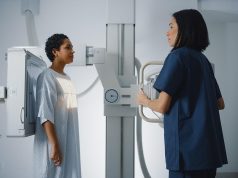Deep learning algorithm could aid malignancy risk estimation of pulmonary nodules detected on low-dose screening CT
THURSDAY, May 20, 2021 (HealthDay News) — A deep learning (DL) algorithm has the potential to assist in the estimation of malignancy risk of pulmonary nodules detected at low-dose screening computed tomography (CT), according to a study published online May 18 in Radiology.
Kiran Vaidhya Venkadesh, from the Radboud Institute for Health Sciences in Nijmegen, Netherlands, and colleagues developed and validated a DL algorithm for malignancy risk estimation of pulmonary nodules detected at screening CT in a retrospective study. The DL algorithm was developed with 16,077 nodules (1,249 malignant) collected from the National Lung Screening Trial between 2002 and 2004. External validation was performed in three cohorts: a full cohort with 883 nodules (65 malignant) and two cancer-enriched cohorts with size matching (175 nodules; 59 malignant) and without size matching (177 nodules; 59 malignant) of benign nodules. Algorithm performance was compared to that of the Pan-Canadian Early Detection of Lung Cancer (PanCan) model.
The researchers found that in the full cohort, the DL algorithm significantly outperformed the PanCan model (area under the receiver operating characteristic curve [AUC], 0.93 versus 0.90). Performance of the algorithm was comparable to that of thoracic radiologists in cancer-enriched cohorts with random benign nodules (AUC, 0.96 versus 0.90) and size-matched benign nodules (AUC, 0.86 versus 0.82).
“This deep learning algorithm may aid radiologists in optimizing follow-up recommendations for participants undergoing lung cancer screening and may lead to fewer unnecessary diagnostic interventions,” the authors write.
Several authors disclosed financial ties to medical device companies, including MeVis Medical Solutions, which funded the study.
Editorial (subscription or payment may be required)
Copyright © 2021 HealthDay. All rights reserved.








